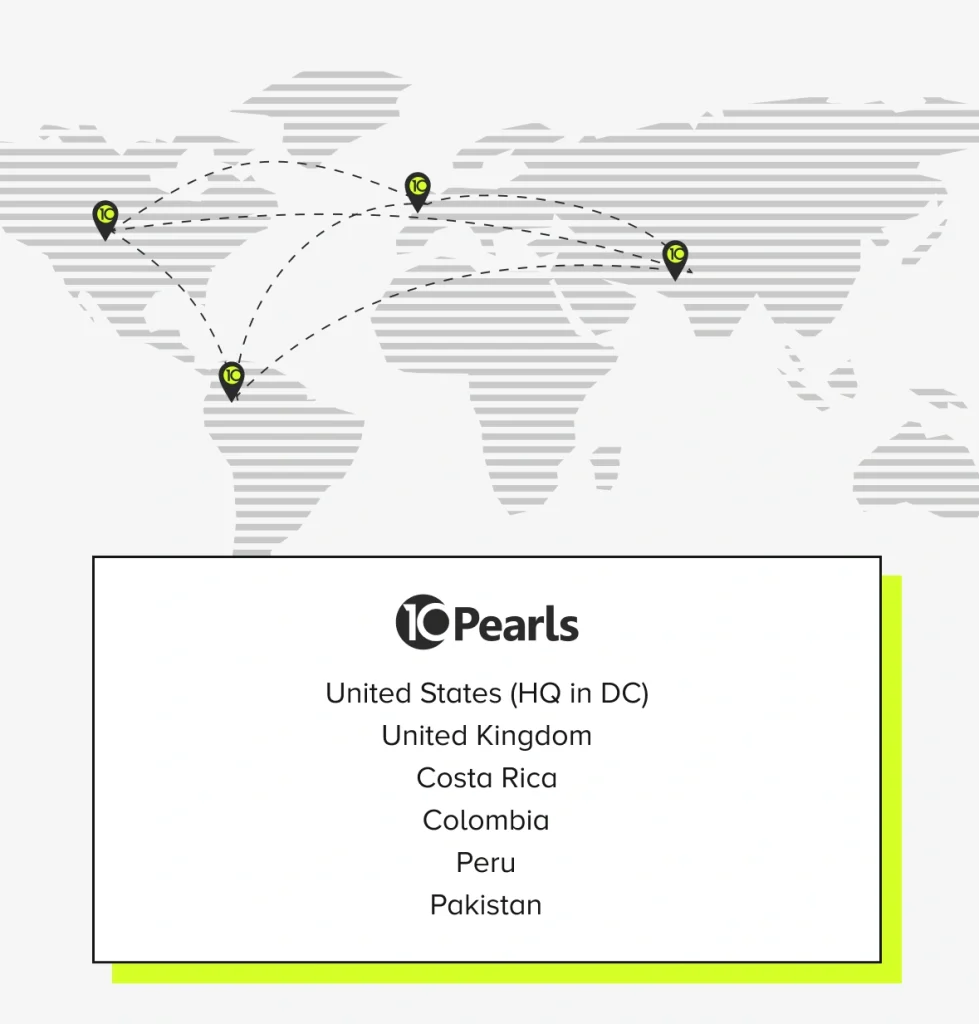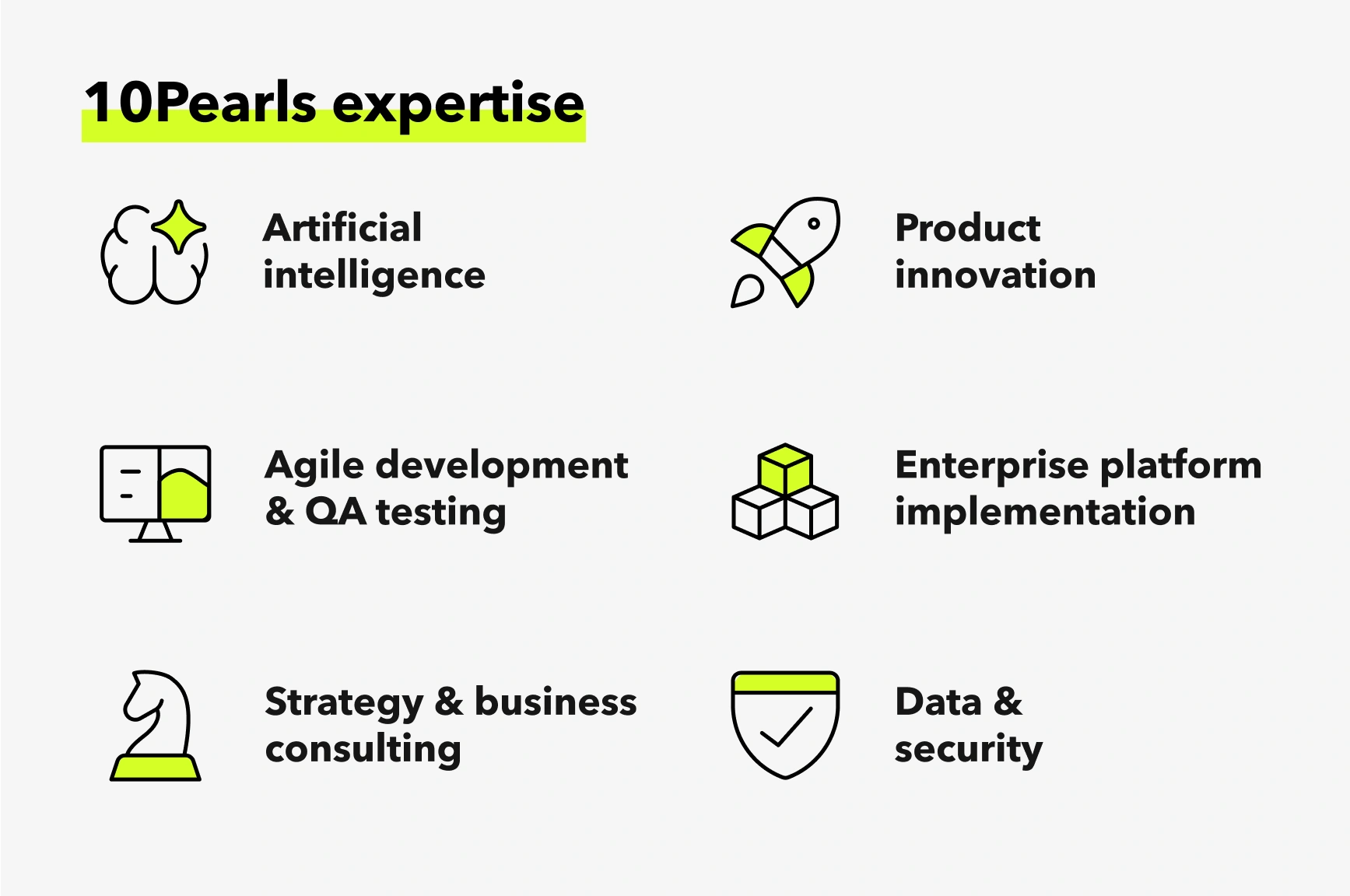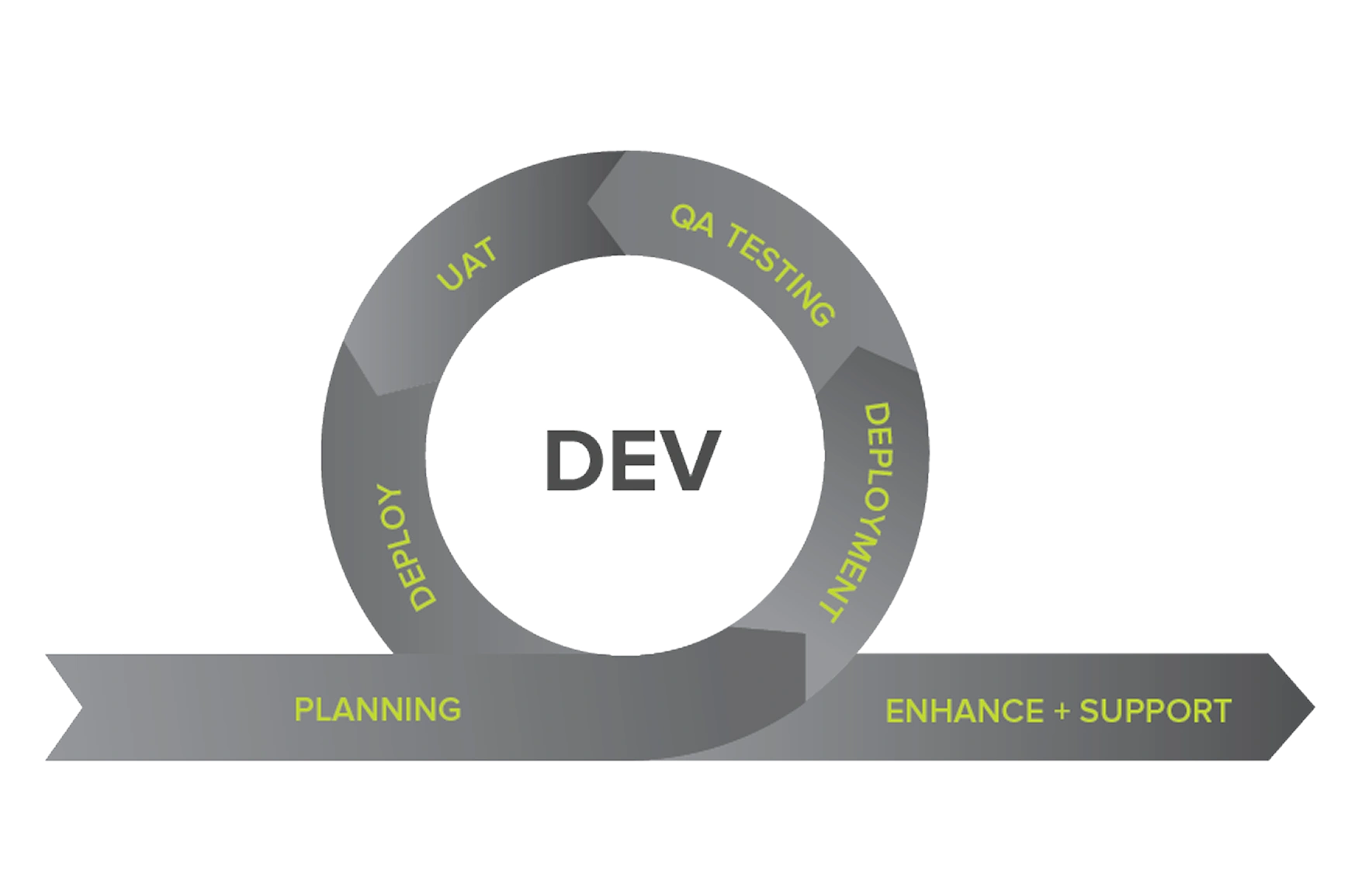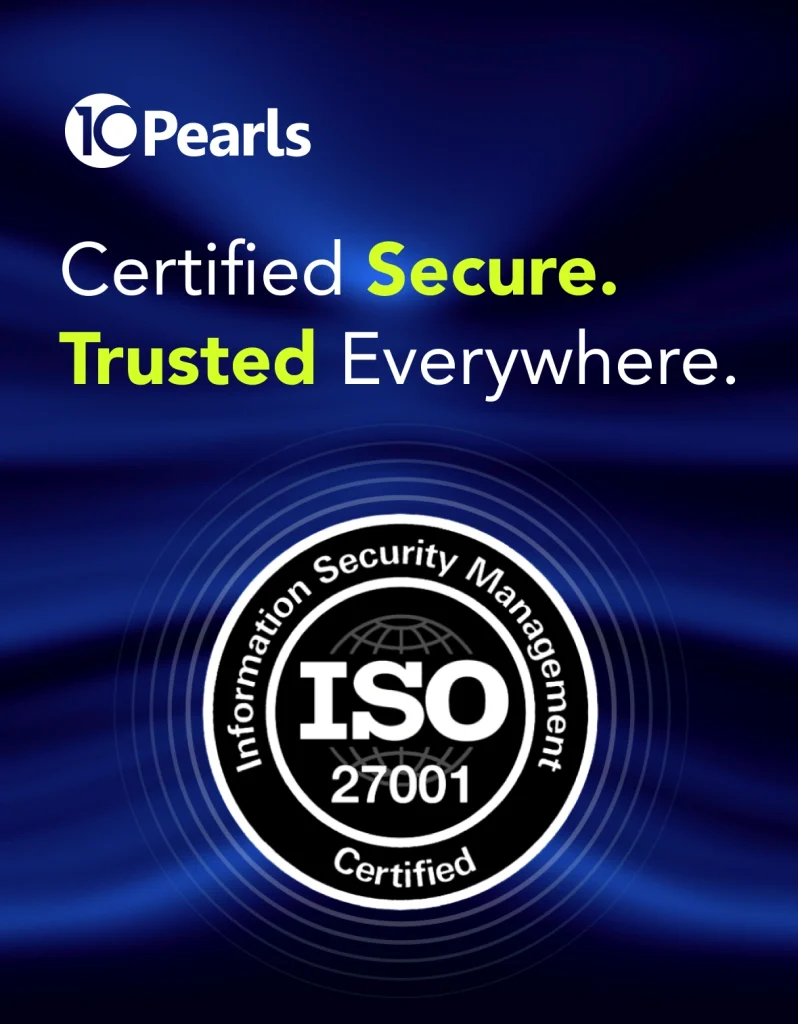

A global team of technologists, strategists, and creatives dedicated to delivering the forefront of innovation. Stay informed with our latest updates and trends in advanced technology, healthcare, fintech, and beyond. Discover insightful perspectives that shape the future of industries worldwide.
11 Questions to Ask When Outsourcing
Software Development
Outsourcing your software development project to an outside firm is a huge decision. However, it can be difficult to know what information you need to make the right choice. The experts at 10Pearls list the 11 most important questions to ask when outsourcing software development to ensure you find a partner that can meet your needs and deliver a successful project on time and on budget.
The following questions will guide your fact-finding mission so you can find an outsourcing partner with the perfect combination of skills and best practices to ensure success. Each link in the table will take you to the explanation below:
- How do you recruit and train your developers?
- How many developers do you have?
- Where are your developers located?
- What are your specializations?
- How do you estimate project timelines and cost?
- What development practices & frameworks do you use?
- How do you handle testing and quality assurance?
- How will you protect my security and privacy?
- How involved will I be throughout the development process?
- How do you handle bug fixes, maintenance, and support?
- Can you provide case studies or testimonials from previous clients?
How do you recruit and train your developers?
To assemble a quality team, you need an outsourcing firm with robust hiring and training practices. Look for a company that uses reputable recruiting tools, hires diverse staff, pays their developers a living wage for their country, and invests in continuous training and education for their employees. You can also look at company reviews in trade organizations that evaluate employee quality of life, as this can be a great indicator of how happy (and thus, productive) their developers are.
10Pearls was recently recognized for the third consecutive year on Built In’s 2025 Best Large Places to Work in Washington, DC. Over 40% of its global workforce is women, highlighting our commitment to building a diverse community of expert developers who can offer new and exciting perspectives that drive innovation.


How many developers do you have?
Even if your project only requires a small number of developers, an outsourcing firm with a large staff will be able to staff your team more quickly with the exact expertise required for your specific project, reducing startup delays. A large talent pool allows a firm the flexibility to adapt to changes in project direction or scope and ensures they can easily scale with your company.
Where are your developers located?
While outsourced developers could theoretically work on your project from anywhere, their location can actually have a large impact on things like cost, communication, and support. Onshore developers, who are located in the same country as your organization, are usually much easier to communicate and collaborate with, but they’re more expensive due to a high demand and a higher cost of living. Offshore developers, who are located on another continent from your organization, typically charge much lower rates due to lower costs of living, but time-zone differences make real-time communication challenging, and language barriers could lead to delays or misunderstandings. Nearshore developers are located in a nearby country and offer a compromise of sorts between the other outsourcing models in terms of pricing and communication.
The best outsourcing company has staff located all over the world, allowing them to offer all three approaches depending on your preference. For example, 10Pearls uses an approach called rightshore that combines onshore, offshore, and nearshore experts for different aspects of the project to keep costs as low as possible while maximizing quality and collaboration.


What are your specializations?
Even if an outsourcing firm has a large recruiting team, that doesn’t guarantee their developers will have the specific expertise required for your project. This is especially true if you’re working with advanced technologies like artificial intelligence, robotic process automation, the Internet of Things, or blockchain. The right outsourcing partner will be able to provide a list of programming languages, tools, and frameworks used in previous projects to demonstrate that their developers have the necessary specializations.

How do you estimate project timelines and costs?
Many organizations outsource development to save both time and costs. Ironically, a significant number of outsourced software projects exceed both their timelines and budgets. This is usually caused by failing to accurately estimate timelines at the beginning of the project or failing to anticipate the roadblocks and delays that commonly affect development time. The best outsourcing firms use well-honed level-of-effort assessments and proven strategies to develop estimates accurately. They openly share their methodology, giving you confidence in an on-time and on-budget delivery.
What development practices and frameworks do you use?
The best development teams follow a combination of proven practices and frameworks to ensure efficient, high-quality software delivery. Agile and Scrum are commonly used for iterative development, enabling flexibility and rapid feedback. DevSecOps integrates security into the development and operations process, reducing vulnerabilities without slowing down releases. Additionally, CI/CD (continuous integration/continuous delivery) automates testing and deployment, minimizing delays while enhancing code quality. By leveraging these approaches, top outsourcing firms optimize both speed and reliability in software development.

How do you handle testing and quality assurance?
Effective testing and quality assurance are essential for delivering reliable software. The best outsourcing firms integrate QA throughout the development lifecycle rather than treating it as a final step. CI/CD is a best practice, embedding automated tests into the development pipeline to validate code quality early and continuously. However, testing approaches and tools vary, so a trustworthy firm will be transparent about its QA processes and ensure its methodologies integrate seamlessly with your development architecture.
How will you protect my security and privacy?
Cybersecurity and data privacy should be a top priority when working with an outside company. Outsourced developers will have access to your company’s network and technology resources, so you need to trust that your outsourcing firm has vetted them properly and follows secure practices. A trustworthy partner will have evidence such as industry certifications and will follow best practices such as using multi-factor authentication (MFA). They will also be transparent about the third-party components used to develop your software. Ideally, the firm should hold recognized security certifications such as ISO 27001, demonstrating a commitment to rigorous information security standards.


How involved will I be throughout the development process?
You likely have preferences for how often your outsourcing partner contacts you and what methods they use to do so, and the right firm will adapt to your chosen communication style. Even if you don’t want to be involved in every single aspect of development, it’s important that your outsourcing partner provides complete transparency into their progress so you’ll never be left in the dark about where your project stands. They should also use the communication method that works best for you and your internal team, whether that’s email, Zoom, Slack, or even in-person meetings. A structured approach, such as Agile or Scrum, ensures regular check-ins and iterative progress updates, allowing for transparency and alignment throughout the development process.
How do you handle bug fixes, maintenance, and support?
Even the most successful software project needs ongoing maintenance and support to fix bugs, patch security vulnerabilities, answer end-user questions, and add new features. If you plan to take on any portion of this responsibility in-house, you need to ensure that your outsourcing partner will provide all the necessary documentation to support your team. If you’re relying on your partner to handle maintenance, you need to know about their service-level agreement (SLA) that defines how support is handled and what the turnaround time is for any issues that come up.
Can you provide case studies or testimonials from previous clients?
The information gleaned from the above questions is, to some extent, hypothetical unless an outsourcing firm can provide evidence in the form of case studies and testimonials from previous clients. These will highlight the firm’s ability to deliver on their promises and ensure they have the experience with your specific industry and type of project. For example, 10Pearls provides numerous case studies describing their innovative work across more than a dozen industries, proving their expertise and ability to successfully meet client expectations.
How to compare potential outsourcing partners
Using the questions above and the rubric below, evaluate the outsourcing firms you’re considering before choosing the best fit for your business.
Evaluation criteria for outsourcing partner
| Criteria | Excellent (3) | Good (2) | Adequate (1) |
| Expertise & experience | Deep expertise in relevant technologies and proven experience with similar projects | Strong technical skills and some relevant experience | Competent but lacks specialization in key areas |
| Top talent | Highly skilled team with dedicated resources | Skilled team with mostly dedicated resources | Competent team but shared resources |
| Tools & industry standards | Uses Agile, Scrum, or another effective methodology with structured reporting | Follows a structured approach with some flexibility | Basic project management with minimal transparency |
| Quality assurance | Robust quality assurance measures throughout the process | Good quality assurance measures at crucial stages | Minimal quality assurance measures |
| Continuing education | Consistent professional development (PD) requirements to dominate the industry | Sporadic PD requirements to remain industry-competitive | Occasional PD requirements to remain industry-compliant |
| Security | Robust security practices that follow industry standards and compliance regulations | Good security measures with minor gaps in compliance | Basic security protocols that lack compliance certification |
| Communication | Quick, clear & proactive communication; time zone alignment | Good communication, minor delays. | Acceptable communication, occasional delays |
Scoring guide:
- 17-21: Outstanding partner – Highly recommended
- 12-16: Strong partner – Worth considering
- 7-11: Acceptable partner – Some risks to consider
Why choose 10Pearls as your outsourcing partner?
10Pearls is a full-service software outsourcing firm specializing in custom software development, AI consulting, and product innovation. Our global and diverse talent pool enables 24/7 productivity using best practices for development, testing, and security.
Get in touch with the experts at 10Pearls to have all of your software development outsourcing questions answered.



